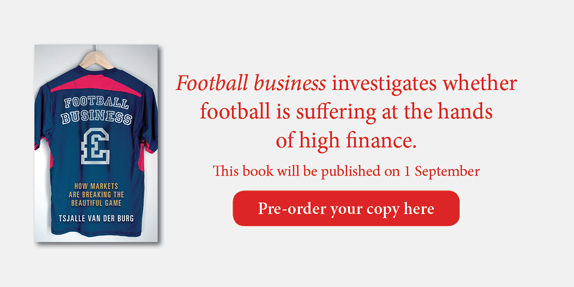Football business: transfer deadline day
1 September 2014 by Catherine Holdsworth in Business and finance, Football Business
It’s transfer deadline day. Now that the world cup is over, the Premiership Autumn season is beginning.We’ve already heard about Balotelli’s move to Liverpool, Sanchez to Arsenal and Diego Costa to Chelsea. The English teams’ injection of European talent will undoubtedly shake up the football season over the next few months.
Until midnight tonight, fans will be refreshing twitter and glued to Sky Sports News to keep up to date with the latest changes, panic buys and assess Harry Redknap’s coping techniques. Such is the importance of the premier league to the fans. Emotional, not to mention financial, investment in teams and payers is huge.
The transfer fees spent on these top players sound like monopoly money to the majority of us, but why are the sums involved so huge? In his new book, Football business, Tsjalle Van Der Burg looks back at the reasons transfer fees are so high, and why clubs are in such a rush to sell off their players before their contracts expire.
Jean-Marc Bosman was a player with Belgian club RC Liège. In 1990 his contract expired and he wanted to move to the French club Dunkerque. However, he was unable to do so because Liège demanded too high a transfer fee. Bosman took his club to court. The case eventually went to the European Court of Justice, the highest court of the EU. Bosman invoked the principle of free movement of workers, which had been part of European law since 1957. In 1995, after five years of legal struggle, the Court vindicated Bosman: it ruled that players whose contracts had expired could move clubs on free transfers. This ruling will remain in force as long as European law is not amended.
The ruling has not only affected out-of-contract players; it has also had a moderating effect on the transfer sums paid for players with ongoing contracts. The reason is that clubs feel pressure to sell a player at a relatively early stage, for fear that he will otherwise leave on a free transfer. To be clear: this is not to say that the total of all transfer fees has fallen since 1995. On the contrary, it has risen. But that is because all the clubs now have more money than they did in 1995. However, total transfer fees would have been higher still if there had been no Bosman ruling.
The ruling has ensured that the big clubs can more easily lure good players away from the small clubs. As a result, the most talented players tend to move to the big clubs at a younger age. The ruling hits the poor clubs hardest; they receive less money from transfers than would have been the case without the ruling. This makes it hard for those clubs to maintain the quality of their sides, because they need a lot of money to pay today’s high player wages. Sometimes clubs overcome the problem of the Bosman ruling with long-term contracts. But these can also work to their disadvantage: if a player fails to fulfil his promise his club may nevertheless have to continue paying his wages for years. All in all, the ruling has weakened the transfer system and it has added to the competitive inequality.
Since 1995 there have been some other, smaller changes in the transfer system as a result of pressure from the EU. For instance, the EU, FIFA and UEFA have agreed that the duration of a contract should be a maximum of five years. It has also been agreed that contracts have to be protected for a period of three years for players up to the age of twenty-eight, and two years for older players. Until now this rule has had little practical effect due to its vagueness; it is not clear exactly what the legal rights of club and player are when a player has served three years of a five-year contract, or two years if he is an older player.
However, it is possible that, in such cases, the maximum transfer fee will become equal to the salary the player would have earned in the remaining years of his contract. This will have a downward effect on transfer fees, and so football will become a bit less competitive still, thanks to the EU.
It is debatable whether the contracts involved are really worth what’s paid for them, and Van der Burg would argue that football has not necessarily been made more exciting or competitive as a result of the massive amounts of cash now spent by clubs. What is clear is that, come midnight tonight, in the final frenzy of buying and selling, there will be new and exciting players waiting to shake up the premiership and make for another thrilling season.

